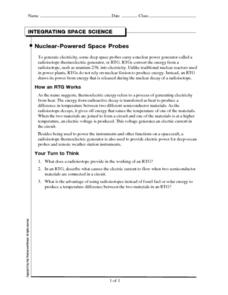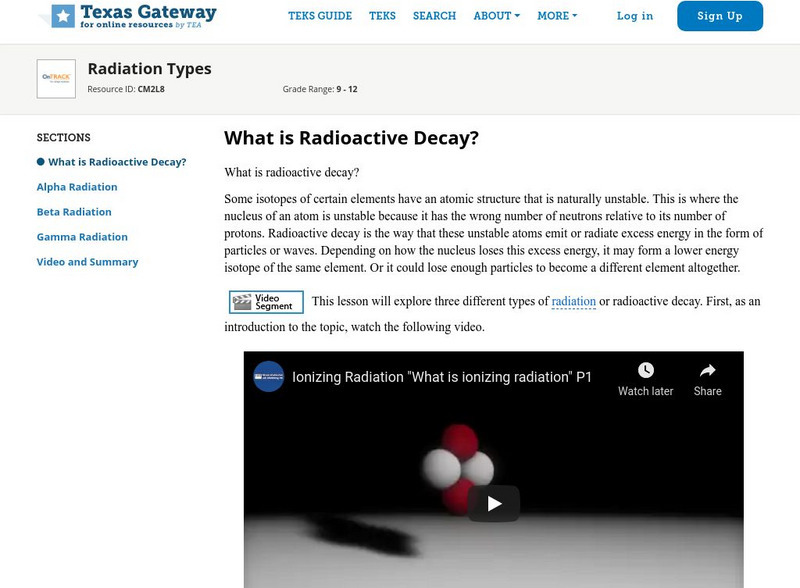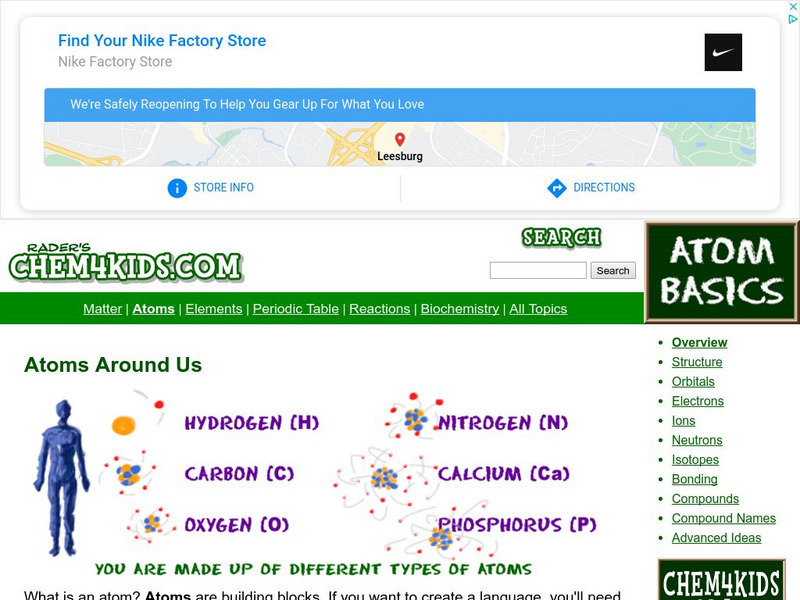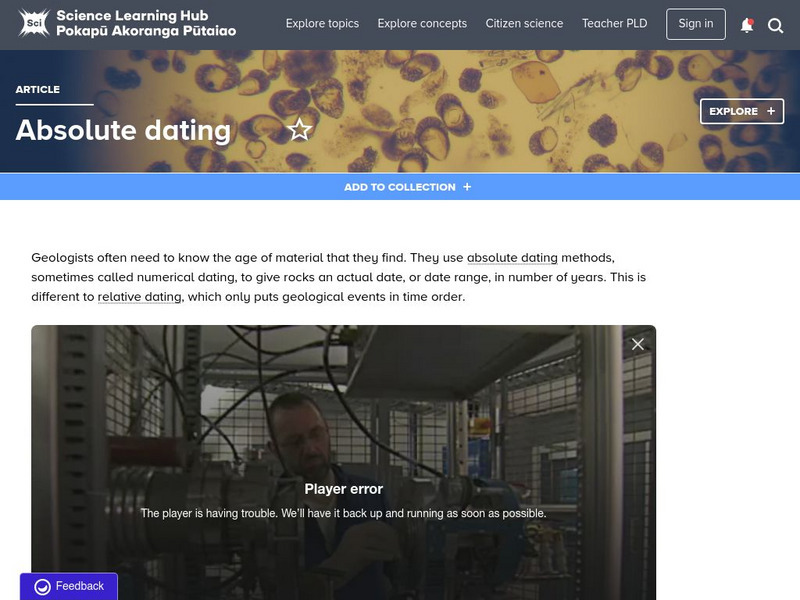Curated OER
Half Life Analogy
Eighth graders explain half life. In this hands on activity, 8th graders use licorice to explain radioactive decay and graph their results.
Curated OER
Measuring Absolute Time
In this absolute time worksheet, students answer eleven questions about ways to measure the age of fossils. They define half-life, answer questions about radioactive dating, tree rings and varves.
Curated OER
Chapter 22 - 25 Review
In this chemistry review worksheet, students explore their knowledge of solutions, acid and bases, nuclear reactions, and radioactive decay as they answer 33 matching, fill in the blank, and short answer questions.
Curated OER
Absolute Ages of Rocks
In this ages of rock worksheet, students review the processes involved with determining the ages of rocks which includes the radioactive decay of carbon-14. This worksheet has 5 matching and 5 short answer questions.
Curated OER
Nuclear Chemistry Homework Problem Set
In this nuclear chemistry worksheet, students evaluate data from concentration experiments on radioactive iodine. They graph the data, determine radioactive decay and half life for the element.
Curated OER
Radioactive Decay
Students explore what radioactive decay is and are able to relate it to the concept of half-life. They are given 100 green beads that represent radioactive atoms and 100 white beads that represent stable, non-radioactive daughter atoms....
Curated OER
A Phylogenetic Perspective for the Cladistically Challenged
Students use M&Ms to simulate radioactive decay of elements.
Curated OER
Radioactive Decay/Half Life
Students demonstrate radioactive decay using candy corns. In this Physics lesson, students make predictions, collect data and form conclusions about patterns in radioactive decay.
Curated OER
Nuclear-Powered Space Probes
In this space probes worksheet, students read about radioisotope thermoelectric generators and how they work. Then students complete 3 short answer questions.
Curated OER
The Nucleus
In this atoms learning exercise, students review terms associated with atoms which includes isotopes, transmutation, and radioactive decay. This learning exercise has 11 short answer questions.
Curated OER
Using Radioactive Decay To Determine Age
Students explore the process of carbon dating fossils to determine their age. They simulate radioactive decay using pennies in a shoe box. Heads represents a decayed atom each time they shake the box. They use the data to calculate the...
McGraw Hill
Mc Grawl Hill: Dino Dig
A virtual lab allows you to do radiometric dating on dinosaur bones. You'll be using a mass spectrometer and utilizing several steps of the scientific method.
Georgia Department of Education
Ga Virtual Learning: Physical Science: Nuclear Chemistry
A complete learning module with interactive activities as well as informational text to help students distinguish the characteristics and components of radioactivity.
Georgia Department of Education
Ga Virtual Learning: Nuclear Physics
Through informational text, interactive activities, and virtual animations students learn about the atomic nucleus, fission, fusion, and radioactive decay.
Story Behind the Science
Story Behind the Science: Just How Old Is Earth? [Pdf]
Article describing efforts in the 19th and 20th centuries to determine the Earth's age, particularly using naturally occurring radioactivity. It notes that scientific disciplines frequently overlap in the work they do. Questions are...
CK-12 Foundation
Ck 12: Nuclear Radiation
[Free Registration/Login may be required to access all resource tools.] In this module, students will understand how radioactivity involves a change in the nucleus of a radioisotope and calculate the conversion of mass to energy...
CK-12 Foundation
Ck 12: Half Life
[Free Registration/Login may be required to access all resource tools.] In this module, students will explore the radioactive decay process in terms of balanced nuclear equations to discover the concept of half-life.
Texas Education Agency
Texas Gateway: Radiation Types
Given illustrations, diagrams, or descriptions, students will identify alpha, beta, or gamma radiation.
Chem4kids
Chem4 Kids: Isotopes
This overview of isotopes explores where isotopes come from and returning an atom to its normal state.
Other
Nrc: Unit 1 Radiation
This site has lesson plans and activities related to radiation. Activities include measuring radiation with a Geiger counter and observing radiation 'footprints' in a cloud chamber.
California State University
California State University Virtual Courseware Project: Radiocarbon Dating
Use interactive graphs and other diagrams to answer questions about carbon dating.
Chem4kids
Chem4 Kids: Atoms
This site provides a detailed overview of atoms. Content explores an atom's structure, as well as what ions are, how atoms bond, what compounds are (including how to name compounds), and what isotopes are.
PBS
Nova: Atom Builder
Find out if you know enough about atoms to build them. The goal of the activity is to build an atom of a particular element by dragging the correct numbers of neutrons, protons and electrons into the atom.
Other
University of Waikato: Science Learning Hub: Absolute Dating
Explains what absolute dating is as compared to relative dating and how they can work together. The characteristics of several different radiometric methods are compared. Includes three short videos and an interactive where students...
















![Story Behind the Science: Just How Old Is Earth? [Pdf] Article Story Behind the Science: Just How Old Is Earth? [Pdf] Article](https://d15y2dacu3jp90.cloudfront.net/images/attachment_defaults/resource/large/FPO-knovation.png)








